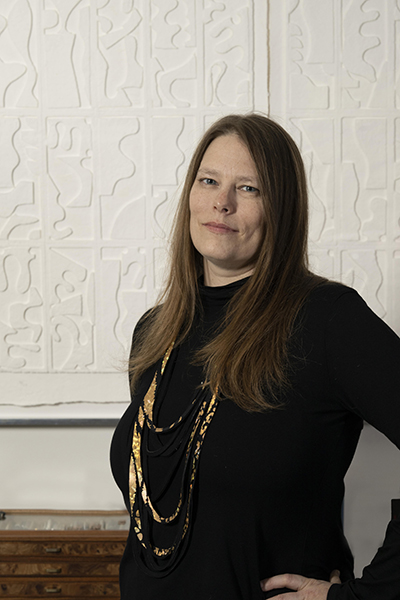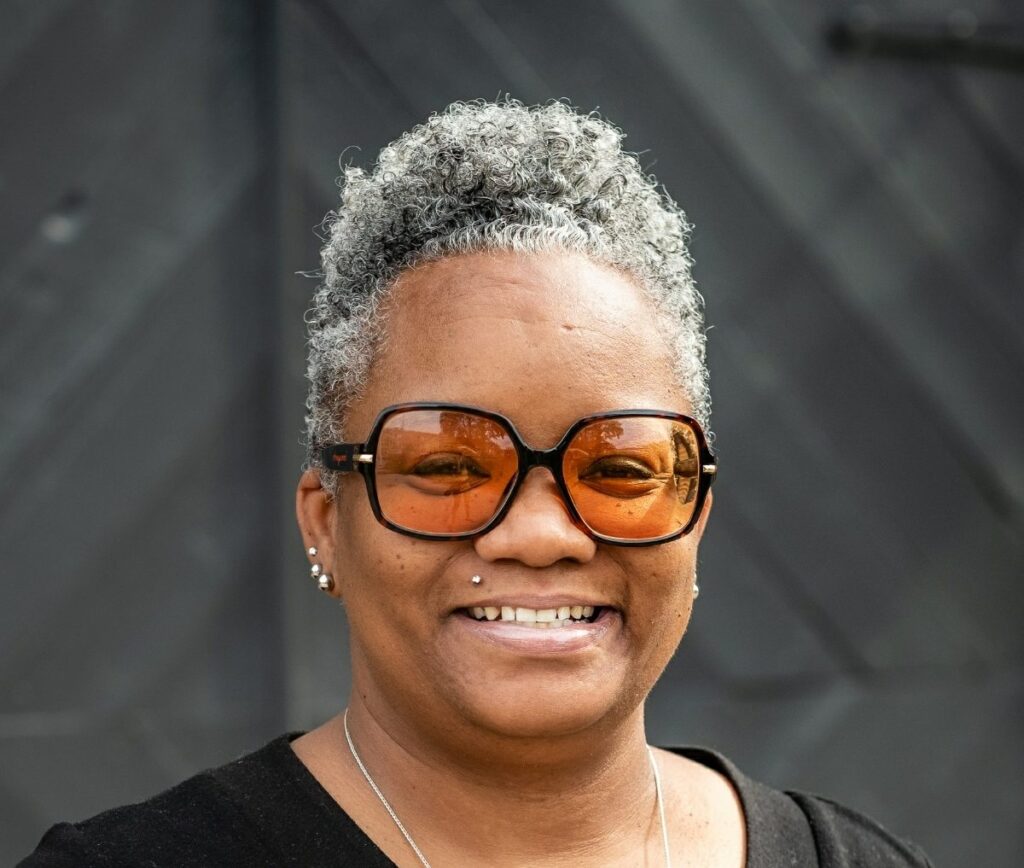
Halima Afi Cassells
Halima Afi Cassells is an award-winning interdisciplinary community-engaged artist, mom of three, and avid gardener, with deep roots in Waawiiyaataanong/Detroit, MI. Born into a creative family, her parents photographed her unsolicited murals and fashions as a kid, encouraging her exploration. Community is the heart of her work. She credits gardening as inspiring her move away from painting to a practice where she aspires to use natural, found, and up-cycled materials and processes that lend to the thriving of all (human and non-human) communities. Halima continues to explore relationship-building, and the notions of freedom and work, value and disposability in a participatory context through projects like the Free Market of Detroit, Traveling Indigo Vat, and her Tables and Thrones series. Awarded the 2023 Kresge Arts in Detroit Fellowship for interdisciplinary art, Cassells continually dives down rabbit holes seeking to understand the interconnectedness of systems and self. A self-guided student of anthropology, macroeconomics, British imperialism and common law, global corporatism, climate crisis, and psychology, she uses her art with the intent of returning to a ‘right relationship.’ As an advocate for artists and cultural practitioners, she has spearheaded many community processes that uplift cultural capital from often-exploited communities and creates in a collaborative context. In addition to Detroit, her work has been featured in spaces in New York, Oakland CA, Oaxaca, Berlin, Copenhagen, Bogotá, and Harare.

Kate Levy
Kate Levy is a filmmaker and multimedia artist. Drawing on investigative and historical research and collaborations with community organizers, her films and installations interrogate power structures and reclaim cultural narratives deployed by these systems. She has worked on projects related to water, education, police violence, immigration, and environmental and economic justice. Kate has exhibited her award-winning film, photography, and installation work at film festivals, galleries, and museums internationally. In 2015, her work with the ACLU of Michigan helped expose the Flint Water Crisis. She is a 2017 Patagonia Works grant recipient for her feature film about water access across the US and a 2018 MacDowell Fellow. From 2019-2021, Kate served as the Co-Director of the Youth Documentary Workshop at Educational Video Center in New York City. In 2022, Kate’s film Detroit Will Breathe helped protesters win a $1.3 million settlement from the city of Detroit, and was awarded Best Short Film from the Whistleblower Film Festival in Washington DC and the Shine A Light Award from the Detroit Free Press Film Festival. From 2023-2024, she is serving as the Stuart B. and Barbara Padnos Distinguished Artist-In-Residence at Grand Valley State University.

Shanna Merola
Shanna Merola is a visual artist, photojournalist, and legal worker. Her sculptural photo-collages are informed by the stories of environmental justice struggles past and present. Traveling to EPA-designated Superfund sites, she has documented the slow violence of deregulation–from her own neighborhood on the Eastside of Detroit, to Chicago’s Altgeld Gardens, and Love Canal, NY. Merola has been awarded studio residencies and fellowships through MacDowell, the Studios at MASS MoCA, Banff Centre for Arts + Creativity, Kala Institute of Art, the Society for Photographic Education, Bulk Space, the Kresge Arts Foundation, the Barbara Deming Memorial Fund, and the Virginia Museum of Fine Art. Her collaborative projects include Detroit Resists: A Digital Occupation of the U.S. Pavilion at the Venice Biennale (2016), Oil + Water
with Kate Levy (2017) and Swan Song with Halima Afi Cassells at the Museum of Contemporary Art Detroit (2022). She has shown her work in solo exhibitions both nationally and abroad at the Czong Institute for Contemporary Art in South Korea. Merola has held teaching appointments at Cranbrook Academy of Art, Wayne State University, the College for Creative Studies, and in the Department of Art Practice at UC Berkeley in California.

Tawana Petty
Tawana Petty is a mother, social justice organizer, poet, author, and facilitator. Her work focuses on racial justice, equity, privacy, and consent. She is a 2023-2025 Just Tech Fellow with the Social Science Research Council, a 2024 National LIO Yearlong Fellow with the Rockwood Leadership Institute, and a member of the CS for Detroit Steering Committee. Petty is an alumni fellow of the Digital Civil Society Lab at Stanford PACS, the Detroit Equity Action Lab, and Art Matters Foundation, and has been a convening member of the Detroit Digital Justice Coalition since 2016. She also serves as the founding Executive Director of Petty Propolis, a Black women-led artist incubator primarily focused on cultivating visionary resistance through poetry, literacy and literary workshops, anti-racism facilitation, and community-centered initiatives. She is a former co-lead of Our Data Bodies and has previously served as Data Justice Director for the Detroit Community Technology Project, National Organizing Director at Data for Black Lives, and Director of Policy and Advocacy for the Algorithmic Justice League. Petty has been honored with several awards. She was honored with a Certificate of Special Congressional Recognition and with Wayne State University’s Center for Peace and Conflict Studies Peacemaker Award in 2018. In 2021, she was named one of 100 Brilliant Women in AI Ethics, and in 2023, Petty was honored with the AI Policy Leader in Civil Society Award by the Center for AI and Digital Policy.

en sawyer
en sawyer is an artist, artisan, meditator, grower, and practical philosopher. He is a co-founder of Taproot Sanctuary, an urban retreat center and intentional community focused on living in the right relationship with the earth and our neighbors in Detroit. Through this community he is exploring and experimenting how to live more interdependently.
Observed: Hypervisibility and Reclamation is organized in conjunction with the Hurford Center’s 2023-24 Faculty Seminar, “Technology & Justice: Mediating Communities,” led by Sorelle Friedler and Laura McGrane. The exhibition is made possible with support from The John B. Hurford ’60 Center for the Arts and Humanities and is co-funded by the Haverford College Initiative for Ethical Engagement and Leadership (IEEL)

